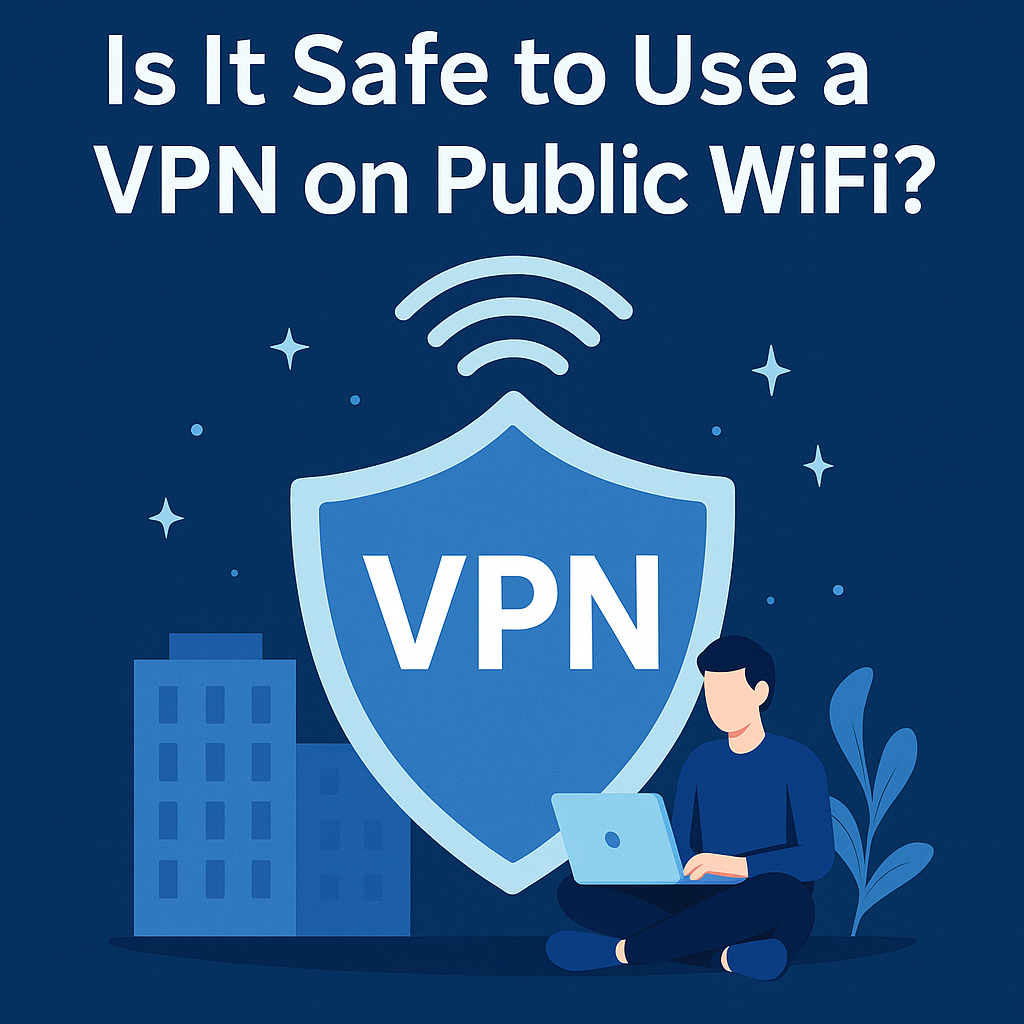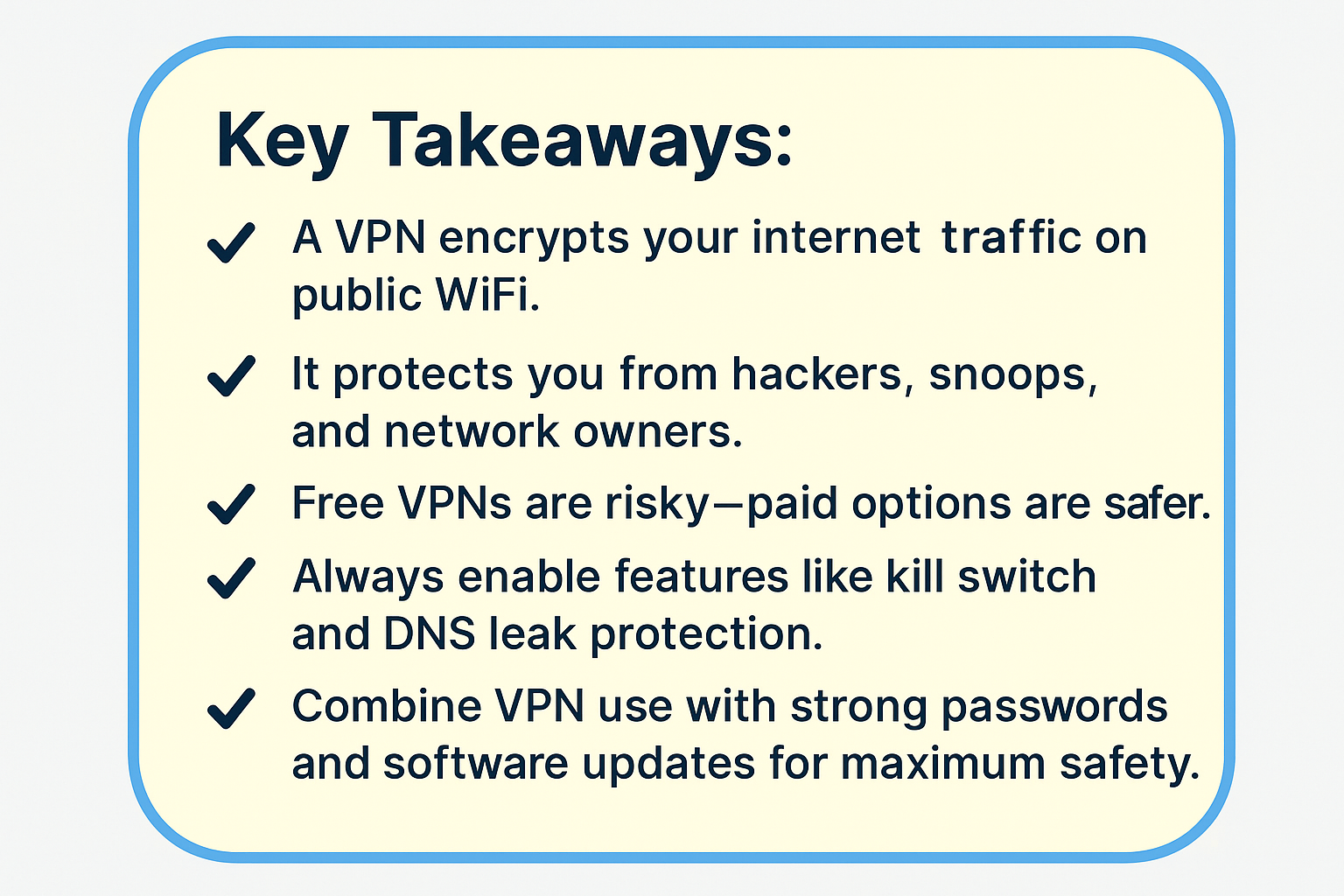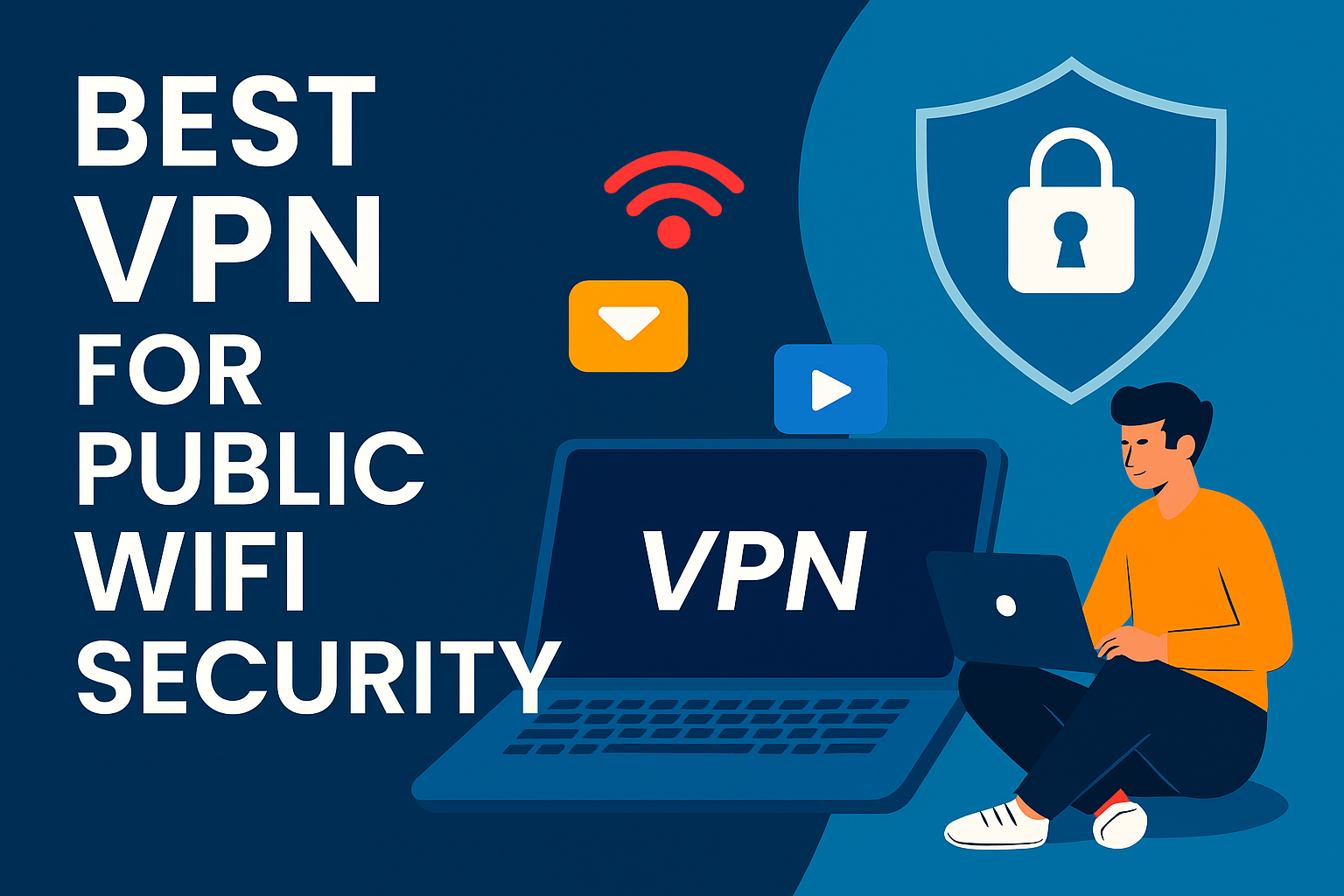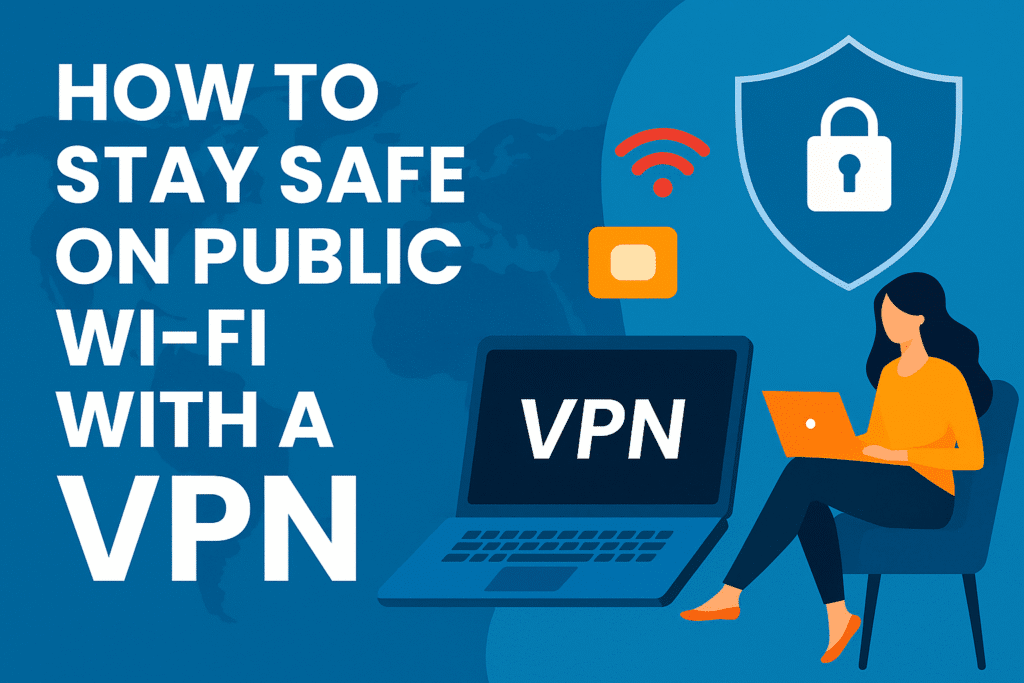
Introduction
Is it safe to use a VPN on public WiFi? This is one of the most common questions travelers, remote workers, and everyday users ask in 2025. Public WiFi is convenient—you find it in cafés, airports, hotels, libraries, and even buses—but it’s also one of the riskiest ways to connect to the internet. Hackers, WiFi owners, and advertisers can all monitor or intercept your activity if you’re not protected
A VPN (Virtual Private Network) promises to be the solution. It encrypts your connection, hides your IP address, and prevents outsiders from seeing what you do online. But does it really keep you safe? And more importantly, is it safe to use a VPN on public WiFi in all situations?
In this detailed guide, we’ll explore everything you need to know about VPNs and public WiFi, from the biggest risks of open networks to the best tools for protection in 2025.
Is It Safe to Use a VPN on Public WiFi?
Yes. Using a VPN on public WiFi is one of the safest ways to protect your data in 2025. It encrypts your connection, hides your browsing from WiFi owners, and reduces the risk of hackers stealing sensitive information. While no tool is perfect, a VPN is the most reliable defense for airports, hotels, and cafés.Why Public WiFi Is Both Convenient and Dangerous
Public WiFi has become a necessity. Travelers expect free WiFi in airports and hotels. Students use it in libraries. Professionals connect in coffee shops between meetings. And in many parts of the world, public WiFi is the only affordable way to get online.
But the same openness that makes it convenient also makes it dangerous. Open networks mean:
- Anyone can join without verification.
- Data often travels unencrypted.
- Network owners may log user activity.
- Hackers can impersonate WiFi hotspots.
For example, when you connect to “Free Airport WiFi,” you might actually be connecting to a fake hotspot set up by a hacker sitting nearby. Every password you type and every site you visit could be captured.
This is why people ask: Is it safe to use a VPN on public WiFi? The answer lies in understanding how attacks happen.

How Hackers Exploit Public WiFi
To understand why a VPN is useful, let’s look at the methods hackers use on open networks:
- Man-in-the-Middle Attacks (MITM): Hackers intercept traffic between you and the website you’re visiting.
- Evil Twin Hotspots: A fake WiFi network mimics a legitimate one (e.g., “CoffeeShop_WiFi_Free”).
- Packet Sniffing: Using tools like Wireshark, attackers capture data packets transmitted over WiFi.
- Session Hijacking: Attackers steal cookies to gain access to accounts like email or Facebook.
- Malware Injection: Hackers use unsecured connections to push malware onto your device.
Without a VPN, all of these are possible. With a VPN, many become significantly harder.
What a VPN Does and Doesn’t Do
Before answering is it safe to use a VPN on public WiFi, we must understand what VPNs actually do.
✅ What a VPN Does:
- Encrypts your internet traffic (scrambling it into unreadable data).
- Hides your IP address from websites and WiFi providers.
- Prevents ISPs and network owners from logging your browsing.
- Creates a secure tunnel, making packet sniffing useless.
❌ What a VPN Doesn’t Do:
- Stop websites from tracking you if you’re logged into an account.
- Prevent malware already on your device.
- Block phishing attempts.
- Replace antivirus or firewalls.
👉 So, is it safe to use a VPN on public WiFi? Safer than without one, but only if combined with other good security practices.
Is It Safe to Use a VPN on Public WiFi? (Direct Answer)
Yes. Using a VPN on public WiFi is one of the safest and smartest things you can do in 2025. Without it, your passwords, financial details, and browsing habits are visible to hackers and WiFi providers. With it, your data is encrypted, making it nearly impossible for outsiders to read.
However, safety depends on:
- Choosing a trusted VPN provider (with no-logs policy).
- Avoiding shady free VPNs.
- Combining VPN use with strong passwords, updated software, and safe browsing.
In short: Is it safe to use a VPN on public WiFi? Absolutely yes—if you use the right one.
Norton reports that MITM attacks are among the top cyber threats happening on unsecured WiFi.
Benefits of Using a VPN on Public WiFi
When people ask, “Is it safe to use a VPN on public WiFi?”, the biggest reason is the benefits. Let’s explore them in detail:
🛡️ 1. Data Encryption
Without a VPN, your data travels across WiFi in readable form. With a VPN, your traffic is scrambled using military-grade encryption. Even if hackers capture your packets, they’ll only see nonsense characters.
🌍 2. IP Masking and Anonymity
Public WiFi providers and websites track your real IP address. A VPN replaces it with the VPN server’s IP, giving you anonymity. For example, instead of showing your café in New York, it could show a server in Switzerland.
🚀 3. Access to Geo-Blocked Content
Public WiFi often blocks streaming services to save bandwidth. With a VPN, you can bypass restrictions and access Netflix, YouTube, or news sites.
👨💼 4. Protection for Work and Remote Jobs
Business travelers often use hotel WiFi to access company resources. A VPN ensures sensitive company data isn’t exposed to hackers on shared networks.
📱 5. Multi-Device Security
Good VPNs protect your phone, tablet, and laptop at the same time. That means you’re safe whether you’re browsing Instagram at Starbucks or logging into your bank account at the airport.
👉 All of this proves that if you’re asking is it safe to use a VPN on public WiFi, the answer is yes—because these benefits dramatically reduc
Limitations You Should Know Before Relying on a VPN
Of course, no tool is perfect. Even with these benefits, VPNs have limitations you must understand.
- Doesn’t Hide Everything: If you log into Google or Facebook, they still track your activity, regardless of VPN use.
- Free VPN Risks: Many free VPNs log and sell your data. Ironically, they can be worse than not using a VPN.
- Slower Speeds: VPN encryption requires extra processing, which may reduce speeds on already weak WiFi.
- Connection Drops: If your VPN disconnects, your data flows unprotected unless the VPN has a kill switch.
- False Sense of Security: Some people think a VPN replaces antivirus, firewalls, or strong passwords—it doesn’t.
👉 So, is it safe to use a VPN on public WiFi? Yes, but only if you use a trusted provider and combine it with other security habits.
Free VPNs vs Paid VPNs on Public WiFi
Many users wonder: should they download a free VPN to protect themselves on public WiFi? Let’s compare.
| Feature | Free VPNs | Paid VPNs |
|---|---|---|
| Encryption | Often weak or outdated | Strong AES-256 or WireGuard |
| Logging | Many log and sell data | Audited no-logs policies |
| Speed | Slow, overcrowded servers | Fast, optimized servers |
| Ads | Frequent ads, trackers | No ads |
| Support | Limited or none | 24/7 customer support |
👉 If you want real safety, a paid VPN is the best choice. A free VPN may give you the illusion of protection while selling your browsing data to advertisers.
VPN Features That Matter Most for Public WiFi
When choosing a VPN, not all features are equally important. If you want to stay safe on public WiFi, prioritize these:
- Automatic WiFi Protection: VPN should auto-activate on unknown networks.
- Kill Switch: Ensures your internet cuts off if the VPN disconnects.
- DNS Leak Protection: Prevents your device from exposing DNS queries.
- No-Logs Policy: Confirmed by independent audits.
- Multi-Platform Support: Works on Windows, macOS, iOS, and Android.
- Strong Encryption: AES-256 or WireGuard protocol.
Case Studies — Airports, Hotels, and Cafés
🛫 Airports
Airports are hacker goldmines. Thousands of travelers connect to the same network daily. Fake hotspots are common, and travelers rushing to connect rarely verify legitimacy. A VPN here is non-negotiable.
🏨 Hotels
Hotel WiFi often logs user activity for “security reasons.” In some cases, hotels also throttle or block streaming. A VPN hides your activity, letting you watch Netflix without interference.
☕ Cafés
Cafés are the most vulnerable. Hackers set up “evil twin” hotspots that look like the café’s real network. Without a VPN, you’d never know. With one, your data remains encrypted.
👉 So, is it safe to use a VPN on public WiFi at airports, hotels, and cafés? Yes—but only if you connect before opening sensitive apps or logging into accounts.
VPN vs HTTPS — Do You Need Both?
Some people think HTTPS is enough, but that’s a myth.
- HTTPS protects data between you and a website.
- VPN protects all traffic between your device and the VPN server.
Without a VPN: your ISP or WiFi provider still sees DNS lookups.
With a VPN: your DNS requests are encrypted too.
👉 Therefore, if you ask is it safe to use a VPN on public WiFi if websites already use HTTPS? The answer is still yes—a VPN covers the gaps HTTPS can’t.
Comparison Table — Top VPNs for Public WiFi in 2025
| VPN | Auto WiFi Protection | Kill Switch | No-Logs Audit | Best Use Case |
|---|---|---|---|---|
| ExpressVPN | ✅ | ✅ | Yes | Frequent Travelers |
| NordVPN | ✅ | ✅ | Yes | Security + Streaming |
| ProtonVPN | ✅ | ✅ | Yes | Privacy Enthusiasts |
| Surfshark | ✅ | ✅ | Yes | Budget-Friendly Users |
| Mullvad | ✅ | ✅ | Yes | Anonymous Users |
👉 You can expand this table with TablePress in WordPress and add affiliate buttons.
Extra Security Tips Beyond VPNs
While a VPN is crucial, combine it with these practices:
- Disable auto-connect WiFi on your phone.
- Use incognito/private browsing to avoid local history storage.
- Enable two-factor authentication (2FA).
- Use strong, unique passwords stored in a password manager.
- Keep your system and apps updated.
- Only visit sites with HTTPS.
👉 [link to streaming VPN post] – Internal link placeholder for your Netflix VPN guide.
FAQs
1. Is it safe to use a VPN on public WiFi in hotels?
Yes. A VPN prevents hotel networks from tracking your activity.
2. Is it safe to use a VPN on public WiFi in airports?
Yes. Airports are prime targets for hackers. A VPN encrypts your data.
3. Can I use a free VPN on public WiFi?
You can, but most free VPNs log your data. A paid VPN is safer.
4. Do I still need HTTPS if I have a VPN?
Yes. HTTPS protects website communication, while a VPN protects your entire connection.
5. What happens if my VPN disconnects on public WiFi?
If your VPN has no kill switch, your data flows unprotected. Always enable the kill switch.
6. Will a VPN stop ads on public WiFi?
Some VPNs block ads, but not all. Pair your VPN with a browser ad-blocker.

Conclusion
So, is it safe to use a VPN on public WiFi? The answer is yes—a VPN is the best defense against hackers, snoops, and trackers on open networks. It encrypts your traffic, hides your identity, and ensures you can browse safely in airports, hotels, and cafés.
But remember: safety also depends on your habits. Use strong passwords, update your software, and avoid shady free VPNs. When combined with good digital hygiene, a VPN transforms public WiFi from a risky gamble into a secure tool for productivity, entertainment, and connection.
👉 Final takeaway: Is it safe to use a VPN on public WiFi? Yes—if you choose a trusted VPN and use it wisely.


